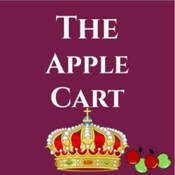
What is the value of a monarchy? That’s the question at issue when a royal power struggle creates a constitutional crisis in George Bernard Shaw’s political satire. The Apple Cart takes place in England in 1967, which was nearly 40 years into the future when Shaw wrote it. With 1967 well in the past, the play’s themes still ring true, and much of what Shaw seems to have predicted has come to pass. Less a story and more a musing on the merits of a constitutional monarchy, The Apple Cart revolves around King Magnus, who finds himself in a showdown with members of his Cabinet over his unchecked power. In comic exchanges between the King and his Cabinet, Shaw explores what happens when massive corporations exert influence over the government against a backdrop of a disengaged citizenry and Cabinet members who are more interested in their own gain. This ensemble play is driven by the ideas espoused by its colorful characters, from the blustery Billy Boanerges to the angst-riddled Prime Minister Joseph Proteus. The play’s title comes from “don’t upset the apple cart”, an expression dating back to ancient Rome which means “don’t mess with a long-standing system”. That’s ultimately the message Shaw sends through the character of Magnus, which he largely based on himself: don’t disturb the monarchy when the monarchy still works.
The Apple Cart guide sections